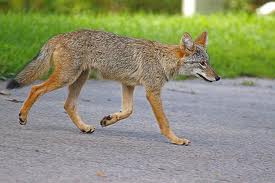Urban coyotes primarily consume rodents, but they also eat garbage, compost, pet food, fruit and vegetables from gardens, birds, insects and the occasional free-roaming cat or small dog, according to the Audubon Society of Portland. They live in burrows, under fallen trees, in brambles and other spaces that some offer protection from the weather.
According to Audubon, "There has only been one human death attributed to coyote predation in the United States. This occurred in California in the 1970s when a coyote that had been deliberately habituated to human handouts preyed upon his human feeder's three-year-old child. In Oregon the only documented "attack" on a human was a provoked situation in which a man was bitten while attempting to beat a cornered coyote to death with a 2x4. Those incidents that have occurred nationwide most often fall into the category of nips, bites and scratches rather than predatory attacks and almost always follow situations in which the coyote has been deliberately habituated to human handouts." If you don't purposely feed coyotes, you're unlikely to have problems with them. You can also take these steps to avoid feeding them unintentionally: * secure trash and compost bins * remove fruit that has fallen from trees * keep pet food and small pets indoors * eliminate opportunities for rats to breed in or around your yard If you see a coyote in Portland city limits, you can report it to the Urban Coyote Project, a collaborative effort between Portland State University geographers and Portland Audubon Society, by filling out an online form. The purpose of the project is to learn more about urban coyotes and how people respond to them.
0 Comments
Your comment will be posted after it is approved.
Leave a Reply. |
Categories
All
Archives
September 2023
|

 RSS Feed
RSS Feed
